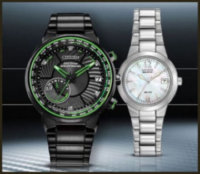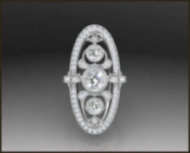New Luxury Focus
The global luxury market is predicted to reach about $1.5 trillion by 2025, with experiential luxury expected to grow by 5%, far faster than personal luxury at 3%, with accessories and cosmetics anticipated to see the most gains in that sector.
A new international study by Boston Consulting Group (BCG) and Altagamma, two powerhouses in the luxury arena, cite Millennials, representing about one third of the spending in personal luxury, will make up half of the total market by 2025. And Gen Z, while representing only about 4% in 2018, is expected to double by next year.
 Dissecting the study, Pam Danziger — luxury market analyst, consultant, author and educator — reports the survey’s six-year perspective on the luxury market identifies six transformational trends that are now well established in the market and will remain part of the luxury business model: omnichannel distribution, mono-brand stores, made-in/country-of-origin authenticity, high-low/mix-and-match, customization, and shopper tourism.
Dissecting the study, Pam Danziger — luxury market analyst, consultant, author and educator — reports the survey’s six-year perspective on the luxury market identifies six transformational trends that are now well established in the market and will remain part of the luxury business model: omnichannel distribution, mono-brand stores, made-in/country-of-origin authenticity, high-low/mix-and-match, customization, and shopper tourism.
The report also cites other trends on the rise that will continue to drive demand, including social media engagement and online sales, which has reached over 20% penetration as the “place” consumers last made a purchase.
Collaboration is Key
BCG/Altagamma research reveals that Millennials are demanding luxury brands look for new ideas and interpretations of luxury outside their company and traditional practices.
Millennials are looking for innovation in design, along with unique collections that reflect their individuality and values. Danziger writes about a conversation she had with Sarah Willersdorf, partner and managing director at BCG, about the findings, with the upshot that collaborations are key to the new luxury market. This is often presented in time drops and limited editions, she reports, which show a brand’s respect for not flooding the market with too much merchandise.
The market also is seeing more pairings of luxury and street wear; and luxury brands developing lasting relationships with organizations and personalities that reflect their values. A great example of the latter is found with Citizen and its “Better Starts Now” initiative, which searches for and accomplishes goals that are cause driven. The watch brand aligns with organizations and personalities that reflect its values, including the Billie Jean King Leadership Initiative, Naismith Awards, National Merit Scholarship, and All Hands Volunteers.
Other collaborations are through licensed partnerships, including Disney and Marvel, that provide a new outlet to tap into an amazing fan base. The brand hints that it has new products in the works to continue to get behind important partnerships. Moreover, Bulova watch, under the Citizen umbrella, continues to strengthen its relationship with the music industry, partnering with Tune of Time, Ultra Music, Windows of Hip Hop, GRAMMYs & Latin GRAMMYs in celebrating an array of talented artists.
The trend for greater collaborations throughout the shopping experience has also fueled the trend for customization. Consumers have come to expect choices in the products they seek, be it change of color, size, materials used, and personalization options like engraving.
Consumers have come to expect choices in the products they seek, be it change of color, size, materials used, and personalization options like engraving.
Neil Shah of Shah Luxury New York, says custom and special orders have been through the roof the past five years, transforming his business to offer these capabilities to jewelers. “Consumers today, especially Millennials don’t want to be sold to, but rather collaborate with vendors. Engaging in the design process, whether in a small or big way, allows them to not only get something unique, but also be a part of the experience.”
Cora Lee Colaizzi, Marketing Director & Senior Merchandiser of Quality Gold in Fairfield, Ohio reports that the company’s customized and personalized products have been center stage for jewelers, with engravable choices, including fingerprint, signatures and handwritten messages popular. She adds that officially licensed jewelry from LogoArt for pro sport, college and Greek affiliations are also bestsellers.
Sustainability Paramount
Next to collaborations, contemporary jewelry consumers want ethically sourced jewelry and, more importantly to know the story behind it, underscores Mark Hanna, CMO for the Richline Group, New York.
Since 2013, the purchase decisions of luxury consumers have shifted dramatically by their concerns about sustainability and social responsibility. More than half of luxury consumers are savvy to a luxury brand’s stance on social responsibility, as compared with 45% in 2013, according to the BCG/Altagamma study. Some 62% say they will choose to do business with a brand that supports sustainability over a brand that doesn’t, compared with 50% in 2013. Sustainability will continue to advance in importance — with the environment, animal care, and ethical manufacturing top concerns.
 Shah says he’s thrilled with The Plumb Club’s recent move to require all new and existing members to become certified members of the Responsible Jewellery Council (RJC). “It’s fantastic and we’re happy to be part of it. Shah Luxury is proud to be a certified member of the RJC. Ethical sourcing is both important to the consumer and to us personally in this business to ensure that we are thoughtful about our impact on the environment and society and leaving a positive legacy.”
Shah says he’s thrilled with The Plumb Club’s recent move to require all new and existing members to become certified members of the Responsible Jewellery Council (RJC). “It’s fantastic and we’re happy to be part of it. Shah Luxury is proud to be a certified member of the RJC. Ethical sourcing is both important to the consumer and to us personally in this business to ensure that we are thoughtful about our impact on the environment and society and leaving a positive legacy.”
Leave a Reply
You must be logged in to post a comment.